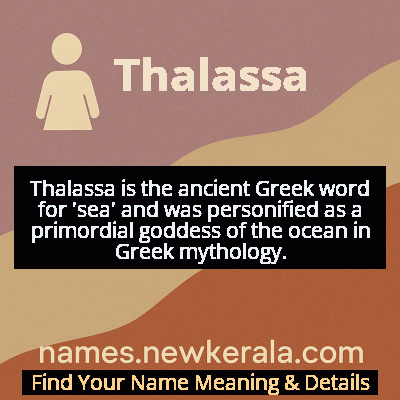Thalassa Name Meaning & Details
Origin, Popularity, Numerology Analysis & Name Meaning of Thalassa
Discover the origin, meaning, and cultural significance of the name THALASSA. Delve into its historical roots and explore the lasting impact it has had on communities and traditions.
Name
Thalassa
Gender
Female
Origin
Greek
Lucky Number
9
Meaning of the Name - Thalassa
Thalassa is the ancient Greek word for 'sea' and was personified as a primordial goddess of the ocean in Greek mythology.
Thalassa - Complete Numerology Analysis
Your Numerology Number
Based on Pythagorean Numerology System
Ruling Planet
Mars
Positive Nature
Generous, passionate, energetic, and humanitarian.
Negative Traits
Impulsive, impatient, moody, and can be overly emotional.
Lucky Colours
Red, maroon, scarlet.
Lucky Days
Tuesday.
Lucky Stones
Red coral, garnet.
Harmony Numbers
1, 2, 3, 6.
Best Suited Professions
Military, sports, philanthropy, leadership roles.
What People Like About You
Courage, energy, leadership, generosity.
Famous People Named Thalassa
Thalassa Cruso
Television personality and gardening expert
Pioneered gardening television programming in America
Thalassa Ali
Novelist
Authored acclaimed historical fiction about South Asian culture
Thalassa Henley
Marine biologist
Advanced coral reef conservation efforts worldwide
Name Variations & International Equivalents
Click on blue names to explore their detailed meanings. Gray names with will be available soon.
Cultural & Historical Significance
Extended Personality Analysis
The name Thalassa evokes personality traits deeply connected to its oceanic origins. Those bearing this name are often characterized by emotional depth and intuition that runs as deep as the sea itself. They possess a natural calmness and serenity in everyday situations, but like the ocean, can display tremendous power and intensity when provoked. Thalassas tend to be highly adaptable individuals who can navigate changing circumstances with the fluidity of water—able to reshape themselves to fit any container while maintaining their essential nature. They often exhibit strong nurturing qualities, reflecting the sea's role as the source of life, combined with a mysterious quality that keeps others intrigued. These individuals typically have a strong connection to nature and environmental causes, and they often excel in creative fields where their depth of emotion and imagination can find expression. While they can be private and reserved about their inner world, Thalassas make loyal friends and partners who offer unwavering support through life's ebbs and flows.
Modern Usage & Popularity
In contemporary naming practices, Thalassa occupies a unique position as a mythological name that feels both ancient and timely. While still relatively uncommon, its usage has been steadily increasing since the early 2000s, particularly among parents seeking meaningful, nature-inspired names with classical roots. The name appeals to several modern trends: the growing popularity of Greek mythological names, the rise of ocean and nature-themed names, and the preference for unique but meaningful choices. Thalassa is particularly favored by families with maritime connections, environmental activists, and those of Greek heritage. It appears more frequently in artistic and academic communities where its classical origins and beautiful sound are appreciated. Social media and naming websites have contributed to its growing visibility, with many parents discovering the name through mythology resources or environmental literature. Despite its rarity, Thalassa has a timeless quality that ensures it never feels dated or trendy.
Symbolic & Spiritual Meanings
The symbolic meanings of Thalassa are as deep and multifaceted as the ocean it represents. Primarily, it symbolizes the unconscious mind—the vast, mysterious depths of human psychology that contain both creative potential and hidden dangers. Like the sea, Thalassa represents the source of life and emotional nourishment, but also the power of transformation and the inevitability of change through its tidal rhythms. The name carries strong feminine symbolism, connecting to ancient concepts of the Great Mother and the womb of creation. In environmental terms, Thalassa has become a powerful symbol for ocean conservation and ecological awareness, representing both the beauty of marine ecosystems and the urgent need to protect them. Metaphorically, it suggests depth of character, emotional resilience, and the ability to remain constant while adapting to circumstances—qualities essential for navigating life's challenges. The name also symbolizes mystery and the unknown, inviting exploration while respecting boundaries, much like the relationship between humanity and the sea.

